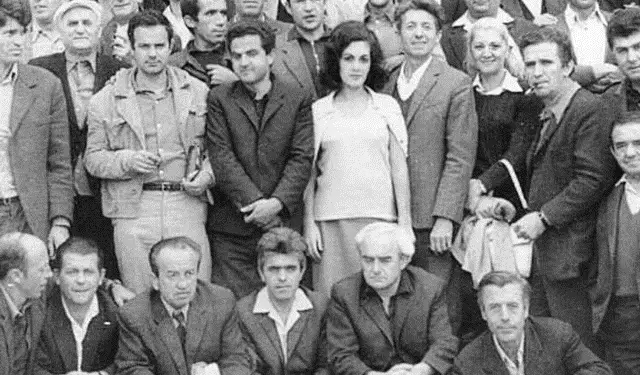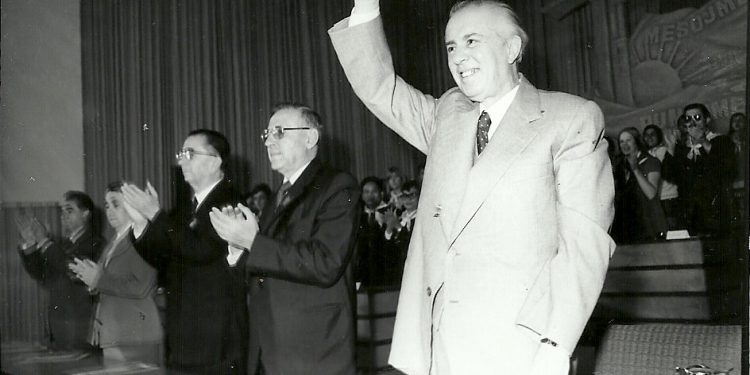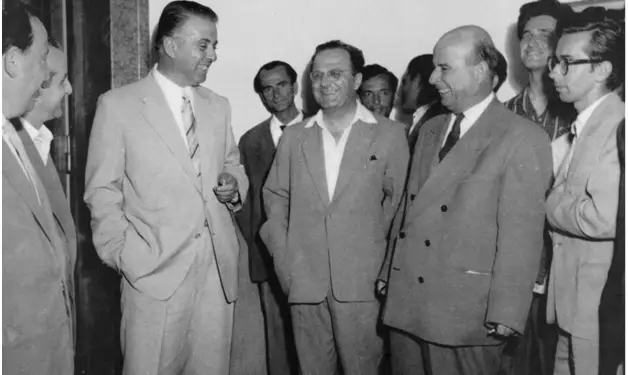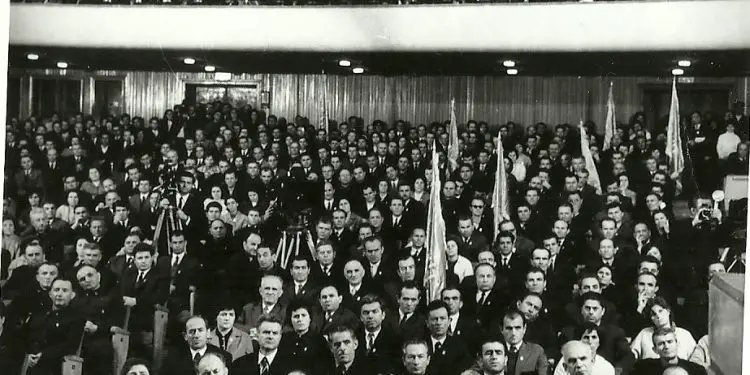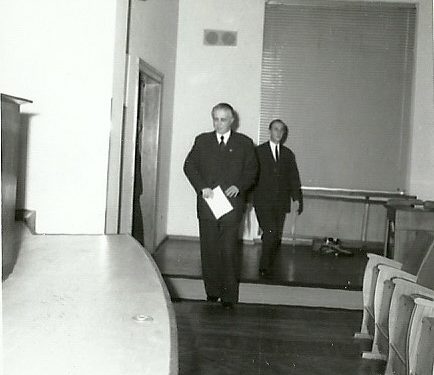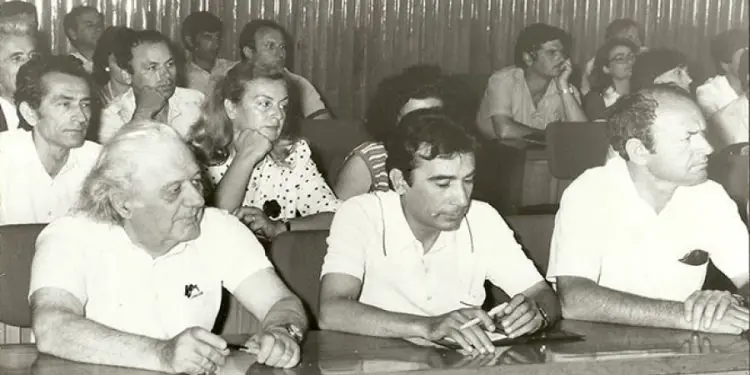Dashnor Kaloçi
The fourth part
Memorie.al publishes some archival documents issued by the Central State Archive in Tirana (fund of the former Central Committee of the ALP), which belong to June 1973, when the IV Plenum of the Committee was held in Tirana Central of the ALP, where Enver Hoxha held the main report on “To deepen the ideological struggle against foreign performances and liberal attitudes towards them.” The unknown speech of Enver Hoxha, which was held mainly only for art and culture and became the “guillotine” of writers and artists, as there were “cut off many heads” of them, being initially dismissed from the duties and functions they had had until then, to end up in the most remote villages of Albania, in mines and construction sites, as well as prisons and internments of the communist regime of Enver Hoxha, such as: Fadil Paçrami, Todi Lubonja, Mihallaq Luarasi, Lluk Kaçaj, Sherif Merdani, Minush Jero, Kujtim Spahivogli, Ibrahim Uruçi, Dhimitër Shuteriqi, Edi Luarasi, Zhani Ciko, Leka Bungo, Bujar Kapexhiu, Novruz Yzeiri, Dorjan Nini, Francesk Radi, Justina Aliaj, Vilson Kilica, Hamide Stringa, etc.
“Phenomena of this nature have been observed in light music, especially in rhythmic music, where there have been deformations of the clear melodic line and the way has been opened to unbridled rhythms. This was especially evident at the 11th Radio-Television Song Festival. Our whole social opinion indignantly rejected that vulgar music, those despised songs and that snobbish performance that this festival brought us on stage. He rightly considers and condemns it as an insult to the best national tradition, popular spirit and partisanship of our art. Such foreign performances have also appeared in some paintings, in the stage presentation of a theatrical and operatic work, on the covers of books, etc. Such deviations have directly affected both the form and the interior of our literature and art. These perverse tendencies are at odds with the partisanship of literature and art, with their formative and educational role, with their popular and national character. “They put a barrier between art and the people, fade the democratic nature that our art should have, spoil the tastes of the working masses.”
This was stated, among others, by Enver Hoxha in his speech held at the IV Plenum of the Central Committee of the ALP, which took place on June 26 and 27, 1973, which was held mainly for the art of culture and became the “guillotine” of writers and artists, as there were “cut off many heads” of them, initially being dismissed from the tasks and functions they had held until then, to then end up in the most remote villages of Albania, in mines and construction sites, as well as prisons and internments of the communist regime of Enver Hoxha, such as: Fadil Paçrami, Todi Lubonja, Mihallaq Luarasi, Lluk Kaçaj, Sherif Merdani, Minush Jero, Ibrahim Uruçi, Dhimitër Shuteriqi, Edi Luarasi, Zhani Ciko, Leka Bungo, Bujar Kapexhiu, Novruz Yzeiri, Dorjan Nini, Francesk Radi, Justina Aliaj, Vilson Kilica, Hamide Stringa, etc., where most of them were released from prison or returned to Tirana only after the fall of the regime communist in the early 1990s.
For more than what was said by Enver Hoxha in the IV Plenum of the Central Committee of the ALP, we know the archival document that Memorie.al is publishing for the first time in several parts (with some abbreviations), starting from today’s writing.
Followed by the last number
Speech of Enver Hoxha at the IV Plenum of the Central Committee of the ALP, held in Tirana on 26 and 27 June 1973
This deviation had to be unmasked and shattered. It had to go from regular and fair criticism, from deliberations to open, mass debates, as the Party practices in these cases, when such people speculate with their thugs. This action was set in motion by the speech I delivered at the Presidium of the People’s Assembly and later at the closing of the proceedings of the last Plenum of the Central Committee. Of course, the Party immediately realized where the hammer was to be beaten and got to its feet. Fiery debates began everywhere. How did these two react before this situation? Too bad, not as communists, but as anti-communists. They feared that their gossip would come out, the mouths of the common people they had despised and threatened would be opened. Fadil Paçrami tried not to go to these meetings, then was forced by others to go. What was his attitude towards the criticism and questions addressed to him? Attitude of the most arrogant. He did not make any self-criticism, he even talked to “us” and not to “me”. “We”, of course, was the committee, the committee, so it was the fault and not this one. Todi Lubonja held the same arrogant attitude and did not recognize his guilt.
All this non-communist attitude was against the principled and partisan attitudes of all other comrades in the field of culture and arts, etc., as well as those comrades who had made mistakes during their work and activity, but who honestly knew them and made self-criticism. My speech at the general meeting of the communists of the apparatus of the Central Committee, gave an extension and a greater depth to the debate that had begun in the Party for the correction of the mistakes and shortcomings that had appeared at work in all sectors and in the people. As you know, in this speech I emphasized the issue of conservatism and liberalism and addressed this issue directly to Fadil Paçrami, with a question that should have been very preoccupying for him, that should have made him reflect deeply and responded to the open and direct criticism I made of them. I made this decision not by chance, but after making an analysis of Fadil’s mistakes and the efforts made by the Party to correct him. This analysis led me to some conclusions that I will list below and the time had come for Fadil to be asked before the Party: “Was he with the Party line, or with the enemy line”? The next day I gave the speech (where Fadil himself was present, although he is not part of that party organization), he requested a meeting with me.
I did not hurry to call him, why such a meeting requested by him became hasty. He was not taking the trouble to either go deeper or reflect on his mistakes and my question, so he would repeat to me those worthless things he had said in other meetings. So, I left it on hold, hoping it would be thought, reflected. More than a week passed and I called her to the meeting. Fadil came with a small pocket notebook, where he had scored a few points. “Listen,” I told him. He started the conversation by telling me that the criticism I made at the meeting was right and he allegedly accepted it. That was just the formula for being supposedly okay, why did he actually have to answer the question I asked: “Are you with the Party line, or are you with the enemy line”? and explain why it is so or not. We listened to him patiently, together with comrade Hysni, and as much as he wanted to talk, he did not talk much. His speech consisted of several points of support, ostensibly in the form of theses, to tell us that “I worked well, that my activity is positive, that in conservatism I strengthened my activity, but I was not so exact to liberalism, that I had some sporadic performances, some intellectualism, some arrogance”. “Some words, some gestures of mine my friends have misunderstood”, etc.
That was all his laconic conversation, measured, weighed. Nothing concrete, very weak self-criticism, to say nothing at all. When it was over, I was forced to tell him what he wanted from me, why in fact he was not asking me for anything to the Secretary of the Central Committee. After the question I asked him, he said: “I want you to advise me”. We advised him, we criticized him socially, we told him that this statement he made was childish, false, it was self-criticism of a culprit who tries to hide his guilt and we counted this guilt, but with the greatest impudence, he rejected them, as he did even here before the Plenum. “They misinformed you,” he said, “it did not happen exactly like that, either.” Such a tactic, of course, did not justify him, so we advised him to reflect deeply on his work, attitudes and mistakes, in case he wanted to help the Party and himself. “The meeting of the Central Committee of the Party is ahead, there to be more open”, I told him “that it is necessary from the points of the small notebook, to come out in self-criticism open in writing and send it to me”. And he sent me this self-criticism. It is at your disposal, you read it friends, why, as you will see, it is very typical. You heard what she said, but now I will say my opinion on this self-criticism and some conclusions I have drawn from it, which reinforce the conclusions I had reached before.
His discussion here fully revealed his true face. When I finished reading Fadil’s self-criticism with the greatest care, I thought and asked myself: “How is it possible”?! So, I went back and read it a second time. Unfortunately, in all the self-criticism, where he analyzed his work and mistakes, Fadil Paçrami spoke only, I emphasize, only twice about the Party and these two times he spoke against. “It is a fact,” he says, “that the distortions and distortions that have taken place in the Party line”, etc., etc. Elsewhere he says that “after the 5th Congress of the Party there were and there are discussions”, this has to do with the “creativity of the 60s”, the period that Fadil defines with friends. The Party does not come out anymore, but I will talk about this below. Does this man speak as a party leader, as a communist? Does he work and fight according to the Party line, according to its directives? Do you follow, implement the directives of the congresses, of the Central Committee, of the Politburo? Nowhere will you find such an affirmation, such a reference in his written self-criticism. He writes as an element that stands outside the Party, above the Party, not confused with the Party.
He expresses himself with such terms “I think”, “I have thought and I think”. He attributes to himself the statements of the Party, the directives of the congresses and of the Central Committee without any sense of simplicity and with the greatest impudence. Successes in the field of culture and arts are not lacking for a good part to dedicate to himself “who fights with all his might for the young, for the innovator”. What work the Party has done here, what work the people of art and culture have done in this matter, are of little importance to Fadil. Why does this forgetfulness resemble a cardinal issue, such as the Party and its line? Where are the mistakes of Fadil Paçrami proven? Certainly, in the crooked and erroneous sense of the Party line on his part, in its erroneous application in practice, and in the open struggle he has waged against the line and the Party itself. Then the simplest logic wants him that in this or that problem where he was wrong, it should be mentioned, even once, which has been the straight line of the Party that he has distorted. Fadil does not do this, he forgets. Is this a simple coincidence? It is impossible to be so and especially in such a document that he considers as “the creed of 30 years of his life, as a framework of the ideological front.”
Fadil Paçrami’s mistakes in implementing the Party line are right-wing. He feels their dangerousness, but he does not have the courage and communist courage to denounce them, to know them openly, to analyze them deeply, to find the sources and goals to be liberated and healed. He finds it difficult to know anything, he says something, but he minimizes it, he finds occasional reasons, to explain it he uses formulas and slogans known as “intellectualism”, he raises the so-called positive sides of his work to reduce them. and obscured these flaws, as you saw and heard yourself in the rostrum. But, with all these maneuvers and others, he does not reveal his big mistakes, nor does he point out the source where they have and where these actions were aimed. We need to help the Party, in the first place, trying to show as realistic and fact-based our opinion as possible. We expressed this opinion once, but we are repeating it now. In the standard self-criticism that Fadil is making, he says that the source of his right-wing liberal mistakes lies in “that I was inclined to fight to the end against conservatism” and, as a consequence, “I did not have the same inclination for him.” waged the same war against liberalism. ”
He justifies this by saying: “This happened because for many years I had a formation and commitment against obscurantism and backwardness” etc. The struggle against medieval and modern obscurantism, against medieval and modern clericalism, against new and old conservatism, against patriarchy, docks and bad habits, canons enslaving people, etc., has been at the root of our Party’s struggle since its formation… This has developed, develops and will continue for a long time a fierce war against them, both in the ideological and political platform, as well as in the practical one. And besides, the Party, on the ruins of this hated old world, builds the new world, the socialist society, the progressive one. And if there was a tendency for these wars, despite the fact that Fadil does not claim it, the Party has taught him this tendency. But we must emphasize, as he himself claims, that on both sides of this war, whether against conservatism or for the cloud, not only has he not excelled, but he has derailed the Party. “I was wrong,” he says, “in the matter of conservatism, why I emphasized this.” To emphasize it is not wrong, but to pave the way for liberalism, under the pretext that it ostensibly fights conservatism, here lies the distortion of the line.
The party has constantly explained theoretically and with concrete war what conservatism is, how it appears, the different forms it takes, where it has its source, how it should be unmasked and fought in different circumstances, isolated and complicated, in different sectors. . The Party has done the same for opportunistic, revisionist, liberal and modernist views. An ongoing fierce struggle is unfolding every day. Fadil Paçrami, to justify and find a non-existent source of his right-wing mistakes in the line, tells us: “I have shown excessive zeal for the fight against conservatism.” However, this statement does not confirm his thesis, but confirms a very dangerous and hardly affirmable point of view by himself, which I will express a little below and which was said here openly and brilliantly by the friends of the Plenum. Has Fadil, as a party member, as a leader and as a writer, as he claims himself, been so strongly committed against medieval obscurantism, against clericalism, against old customs? Is this distinguished from the others, even over those simple heroic highlands of the highlands? Aspak! Has he written any satire, any book or any drama against religion, against priests or imams? Has he held conferences and special articles on these issues so that we can say here today: “Yes, this is so, as Fadil says.” No at all! His whole argument in this matter is that in a poet’s operetta libretto, about Skanderbeg, we were also given a popular priest that Fadil, according to him, proposed to remove. At least we can say that, in terms of fighting in these directions, Fadil Paçrami has done much less than a simple member of the Party has done.
All sound communists, following the line of the Party, fight conservatism, but not to be liberal and opportunistic, but to be neither conservative nor liberal, they fight, therefore, both liberalism and conservatism. While Fadil Paçrami embraced and defended right-wing views, contrary to the Party line, it is understood and explained “his great zeal for the fight against conservatism, backwardness, etc.” For Fadil Paçrami, conservatism in the old sense, as in the classical sense, is added to the “new conservatism”, which according to him exists in the Party. So, the line of our Party, according to the opinion, according to the facts, said and made by Fadil Paçrami, is conservative and should be liberalized, modernized, liquidated and a new party created. Fadil Paçrami and Todi Lubonja joined this anti-party and deeply hostile work. When Fadil claims that he tended to fight conservatism and did not tend to fight Beralism, he claims that he did not fight in the Party line, but in opposition to and against it, because with these views everything that was not liberal, as Fadil thought, she was conservative, so she had to fight hard.
In the war on both sides he was not in the line of the Party and he affirms this himself, however the fight against conservatism, according to him, he seeks to pass as “a positive issue.” The same problem, the same concept of his in terms of “obscurantism and backwardness”, against which Fadil was committed, as he says. To fight, as he claims, against obscurantism and clerical, medieval and feudal backwardness, this does not lead to what Fadil fell into, to the obscurantism and degeneration of decadent modernist bourgeois literature and art. So, his struggle was not at all in the line of the Party, it was not based on our ideology, it was even very formal and specifically in open contradiction, why Fadil could not and did not want to distinguish those liberal concepts where had slipped, defended and supported the same obscurantists, enemies of the progress and progress of mankind. Therefore, there is nothing positive in the theses that Fadil brings in defense of his defenseless mistakes. Fadil says in his self-criticism that “I did not always know how to distinguish what is really new and progressive”. It is possible that a friend does not even notice what Fadil says indirectly, but he is obliged to further state, of course in general, that “when I saw foreign influences, I reduced their risk, I have made concessions and I have made these foreign influences and concessions in literature and arts, in poetry, in music and in painting, I did not appreciate the increasing risk of the appearance of prostitution, fashions, breaches of discipline, etc.
As can be seen, this is neither a simple mistake, nor an isolated one, nor a case, where a person who is not politically and ideologically elevated can fall. These are numerous anti-party mistakes and on a broad front. Fadil himself, rightly, excludes the issue that he did this because he was not raised. But these mistakes of his on the broad front, the time has come to recognize them, to determine them, to find their origin. Of course, in the first place he brings out his “intellectual views”, which, according to him, have thrown him into a contradiction. What is this contradiction? He’s supposedly strongly engaged in revolution, but in practice he does the opposite of what he says. In other words, this means not being revolutionary or using the slogans “contradiction” and “intellectualism” to hide what is clear, to be contrary to the Party line, in theory and in practice, and to disguise the war. against her. How can what Fadil says be like “I have committed myself and I have fallen into liberalism, I have spoken right and I have acted crookedly”? “This is my contradiction,” he says! Really strange contradictions for a person who calls himself a communist and a revolutionary. But it would be unfortunate for such communists to explain the mistakes so simply and after each of their submissions to come up with the refrain, as Fadil Paçrami puts it: “This does not make me my main feature, or these are small things before the general my work”.
There is no doubt that Fadil Paçrami is a sick intellectual, but to naively admit that he is a revolutionary, we are not allowed by his facts and activity and we do not eat that. As undeniable is his sick intellectualism, so dubious is his revolutionaryism. All the arguments he brings (he always does this in general terms to prove that he ostensibly fought for the young, for the beautiful, for the revolutionary, etc.) do not stand, even though he knows that the work and views of show the bad side of the “revolution” ala Fadil, he adds that before concrete phenomena has not always maintained a right attitude, there have been concessions, liberalism, etc. According to him, Fadil slipped into “intellectualism”, caused by the intellectual circles, where he lived and worked, their pressures have made this wrong. Surprisingly, the bad pressures have influenced, and the pressures of the good and partisan people of literature and the arts, who are the vast majority, have not influenced him. The question arises: Were the sick intellectuals who influenced Fadil, or did he influence, help and encourage them as a crooked communist and as secretary of the Party committee dealing with this sector? Certainly, both sides have influenced each other and thus created a barrier and a disease in the bosom of our sound popular writers and artists.
This responsibility that he bears for the mistakes he has made, he knows little now in the last hours, why so far, he has denied them arrogantly, as he denied them here, too, arrogantly. But even now in the last hours he does not fail to say: “While mistakes have been made in these areas, such as the 11th Radio-Television Song Festival, influences on poetry, music and painting, and I deal with these sectors “I also have responsibilities.” And where does the responsibility lie? He adds: “Because I did not catch them, I did not rise against them in time, I did not cause problems for the Party.” According to Fadil Paçrami, the Party was fast asleep, Fadil Paçrami was the “Pope of literature and arts”. The party, according to him, from a Leninist party, was reduced in such a way that everything was waiting for him, “to signal, to catch, to make issues”, only Fadil Paçrami. This megalomaniac forgets that all the revolutionary activity in these fields and in all others has been led and is led by the Party, while Fadil Paçrami and some of his friends have led the anti-party activity. Their anti-party activity these elements remind that the Party, theoretically and practically, was not fighting every hour, every day.
Fadil Paçrami forgets or does not want to say that against his and his comrades’ attitudes, the Party has reacted constantly, from the grassroots organizations to the top leadership. They have repeatedly and harshly criticized Fadil and his actions, the injustices he has done or tried to do, which, when known, were immediately put in place. “These bad things,” says Fadil with the greatest impudence, “I did not catch them.” But the Party caught these and made problems of the communists and the masses every day. This, in turn, fought everywhere and successfully against the intellectualism that covered you, fought for the grassroots organization to lead, and you and your comrades waged an anti-party war to eliminate it from the middle. The party fought against technocracy that you systematically worked to bring and bring into cultural and artistic institutions degenerate, servile and worthless people, to please and through them impose with arrogance and intimidation on those elements that oppose; The party fought for the line of masses, while you opposed this line.
You have not implemented the directives of the Party congresses of the Central Committee. In the Party and in its leadership, these have been pointed out many times. All the just issues that the Party and the people fight to protect and implement in life, all the evils to be fought are clear in all the documents of the Party. Why did you not take them into account? Why didn’t you implement them? Why did you not correct the mistakes, when they were pointed out to you? These questions matter. Are you with the Party line or with the enemy line? It is not enough now in the last hours to claim that you have a sick intellectualism or you are arrogant. Many friends have made various mistakes at work, there have also been displays of intellectualism or arrogance, but they have never been asked like this, why the mistake is possible, but they have understood, they have been corrected, they have become very good friends. , why they had great, endless trust in the Party. As for you, Fadil, this faith has been shaken, it has disappeared. And the evidence that we brought here and that I will say below proves that. /Memorie.al
Continues in the next issue





